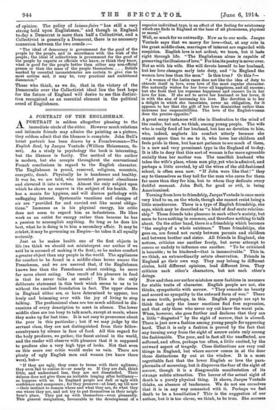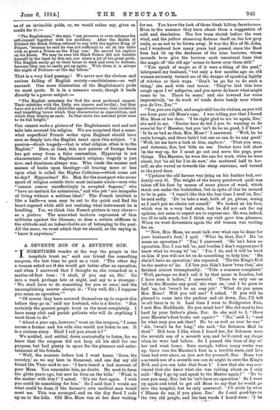A PORTRAIT OF THE ENGLISHMAN.
.ALPORTRAIT is seldom altogether pleasing to the immediate circle of the sitter. However much relations and intimate friends may admire the painting as a picture, they seldom admit that the likeness in complete. John Bull's latest portrait has been drawn by a Frenchwoman—The English Soul, by Jacque Vontade (William Heinemann, 6s. net). As a study in psychology the book is interesting, but the likeness is faulty. The method of the author is modern, but she accepts throughout the conventional French conclusions in regard to the English character. The Englishman is proud, reserved, religious, eccentric, energetic, dumb. Physically he is handsome and healthy. It was he, we are told, who invented personal cleanliness and elevated it into a virtue. Almost the only subject upon which he shows no reserve is the subject of his health. He has a mania for hygiene, and will discuss pathology with unflagging interest. Systematic vacations and changes of air are "provided for and carried out like moral obliga- tions." Immense as is his physical energy, his critic does not seem to regard him as industrious. He likes work as an outlet for energy rather than because he has a passion to accomplish anything. So long as he does his best, what he is doing is to him a secondary affair. It may be cricket, it may be governing an Empire—he takes it all equally
seriously.
Just as he makes health one of the first objects in life (we think we should not misinterpret our author if we said he is accused of making it the first), so he makes comfort a greater object than any people in the world. The appliances for comfort to be found in a middle-class house amaze the Frenchman, and we are assured that, if the Englishman knows less than the Frenchman about cooking, he cares far more about eating. One result of his pleasure in food is that he never talks at meals ! This is the only deliberate statement in this book which seems to us to be without the smallest foundation in fact. The upper classes in England either are, or have determined to appear, too lively and brimming over with the joy of living to stop talking. The professional class are too much addicted to dis- cussions of every description to meet in silence. The lower middle class are too busy to talk much, except at meals, where they make up for lost time. It is not easy to pronounce about the poor in this particular ; but if we may judge by the servant class, they are not distinguished from their fellow- countrymen by silence in face of food. All this regard for the body produces, we gather, the finest animal in the world, and the reader will observe with pleasure that it is supposed to produce also a very high type of looks. Not that even on this score our critic would make us vain. There are plenty of ugly English men and women (we knew there
were), but— "If they are ugly, they come to terms with their ugliness ; they even fail to realize it—or nearly so. If they are dull, think little, and understand less, they are not dissatisfied. Their dulness does not give them an irritable longing after brilliancy— as happens with us. In England people are dull or ugly with confidence and composure; for they preserve—at least, up till now —their instinct to remain where and what they are, do what they can where they are, and not try to put themselves in their neigh- bour's place. They put up with themselves—even pleasantly. This general resignation, favourable to the development of a superior individual type, is an effect of the feeling for aristocracy which one finds in England at the base of all phenomena, physical or moral."
Well, so much for us outwardly. Now as to our souls. Jacque Vontade says that we marry for love—that, at any rate in the great middle class, marriages of interest are regarded with suspicion. English love is not ardent, we learn, but it lasts right through life. "The Englishman alone is capable of preserving the illusions of love." For him its poetry is never over. Not so with his wife. She will devote herself to her husband, but her love changes early into duty, and "in England the women love less than the men." Is this true? Or this ?— " A woman of the Latin races does not like the idea of duty to obtrude itself in love, even love of the most regular character. She naturally wishes for her lover all happiness, and all success; but she feels that his supreme happiness and success lie in her love for him. If she act to serve her husband or her lover, it is with the aim of increasing his love. Her devotion is to her a delight in which she luxuriates, never an obligation, for it appears to her that the gift of her love diminishes rather than increases her responsibilities. The love of the Englishwoman does the precise opposite."
A great many instances will rise in illustration to the mind of the reader, but not, we think, among young people. The wife who is really fond of her husband, but has no devotion to him, who, indeed, neglects his comfort utterly because she cannot spare time to see to it, who loves her children and feels pride in them, but has not patience to see much of these, is a new and very prominent type in the England of to-day. It is idle to deny that this sort of woman is far more agreeable socially than her mother was. The unselfish husband who takes the wife's place, whom men pity, yet who is admired, and perhaps a little coveted, by all the wives of the old-fashioned school, is often seen now. " If John were like that ! " they say to themselves as they toil for the man who cares for them far more than they for him, but to whom they dedicate every dutiful moment. John Ball, for good or evil, is being Americanized.
Turning from love to friendship, JacqueVontade is once more very kind to us, on the whole, though she cannot resist being a little mischievous. There is a type of English friendship, she says, which may be described as "a kind of deaf-mute relation- ship." These friends take pleasure in each other's society, but seem to have nothing in common, and therefore nothing to talk about. On the other hand, there is a friendship which becomes "the employ of a whole existence." These friendships, she goes on, are found not rarely between parents and children and between brother and sister. All friends in England, she notices, criticize one another freely, but never attempt to coerce or unduly to influence one another. "To be criticized is bearable ; to be hindered—that is inconceivable." This is, we think, an extraordinarily astute observation. Friends in England go their own way. They may belong to different circles, hold different opinions, lead different lives. They criticize each other's characters, but not each other's doings.
Now and then our author mistakes mere fashions in manners for stable traits of character. English people are not, she thinks, sympathetic with sorrow. " They concede no beauty and accord no sympathy to the outward form of woe." There is some truth, perhaps, in this. English people are apt to think that only the lesser emotions find free expression, and that only those who never cry out know the worst pain. When, however, she goes further and declares that they are a little " disgusted" by the sight of sorrow, that is absurd. There is just now a fashion among young people for appearing hard. That it is only a fashion is proved by the fact that any turning away from the sight of sorrow exists only among the fashionable. The poor, and in fact all the unaffected, are softened, and often, perhaps too often, a little excited, by the outward aspect of tragedy. Class distinctions are very real things in England, but where sorrow comes in at the door those distinctions fly out at the window. It is a most regrettable fact that the lower English so love the para- phernalia of mourning, but it disproves the fear of the sight of sorrow, though it is a disagreeable manifestation of its strange subtle attraction. The horror of the actual sight of death is a purely physical thing. It shows, Jacque Vented° thinks, an absence of tenderness. We do not see ourselves that it is in any way connected with it. Perhaps we feel death to be a humiliation P This is the suggestion of our author, but it is too clever, we think, to be true. She accuses us of an invincible pride, or, we would rather say, gives us credit for it ,,The Englishman," she says, "can preserve or even enhance his self-respect together with his snobbery. After the Battle of Poitiers the Black Prince refused to sup with the captive King of France, because he said he was not sufficient to sit at the table with so great a Prince as the King was.' He served his captive on his knees. We may be sure the Black Prince did not humble himself in the least by this act, nor abate a jot of his great pride. The English easily go on their knees to rank and even to fortune, because they can so easily get up again. With them it is always the night of Poitiers—or the day before."
That is a very kind passage ! We never saw the obvious and serious failing of English society—snobbishness—so well excused. One more illustration of the Englishman's pride we must quote. It is in a measure comic, though it leads directly to a graver subject :— " The English entertain for God the most profound respect. Their relations with the Deity are sincere and cordial; but they have not a whit of that child-like apprehensiveness, that credulous and trembling terror which they characterize as superstition, and which they despise as such. In that scorn the national pride rises to its full height."
One cannot make a picture of the Englishman's soul and not take into account his religion. We are surprised that a some- what superficial French writer upon England should have seen so deeply into the English heart upon this subject. "A passion—dumb tragedy—that is what religion often is to the English." Here, at least, this new painter of foreign faces has got away from a false convention. Hypocrisy is not characteristic of the Englishman's religion; tragedy is just now, and dumbness always was. Who reads the masses and masses of books upon theology—all bearing more or less upon what is called the Higher Criticism—which come out to-day P Hypocrites P No. Men for the most part who never speak of religion outside their most intimate circle—men who "cannot concur tuarefiectingly in accepted dogmas," who "have no instinct for submission," and who yet "are incapable of living without a sublime ideal." The French intellect is like a knife—a man may be out to the quick and find his heart exposed while still not realizing what instrument he is handling. Yes, we think this French picture is very clever— as a picture. The somewhat taciturn expression of face militates against the likeness; so does a certain stiffness in the attitude and an indescribable air of belonging to the past. All the same, we must admit that we should, as the saying is, "know it anywhere."











































 Previous page
Previous page